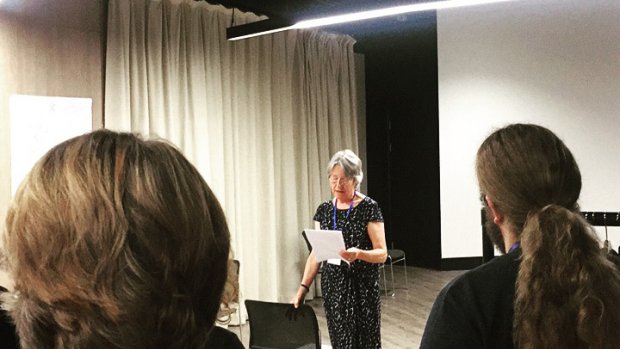
A transcript of Nicola's touching speech at the launch of #BMC50
We officially launched the 50th birthday celebrations of The British Music Collection on the 2nd of November at Heritage Quay in Huddersfield where the physical collection is stored. We were honoured to have Nicola LeFanu Composer and long-term supporter of the collection speak at the event. Nicola has kindly provided us with a transcript of her words from the evening to be shared here on the digital collection. You can read them below.
"We are here to celebrate something remarkable. Fifty years ago, a few farsighted people put together some scores and recordings of British music, in the hope that it would encourage performers to look further than familiar classics. Who would have thought that from that modest collection would grow this amazing resource, at once a library, a living archive, an online forum and a seedbed for future developments.
Certainly, the Collection is a library, and as a library it is a goldmine because it is both a physical and a digital resource. Precious scores and recordings from the past are properly conserved, while new work finds a home here. But I think of it as much more than that: it is a gateway to journeys of discovery. Whether you begin by searching for recordings and scores or by following a spotlight topic, you are soon drawn to links that take you further afield – maybe to a composer’s website or to a recent blog.
These days when we can access any music from any time there is such a danger of laziness. The Collection, the BMC, allows us to go deeper, it encourages us to be selective and to become acquainted in detail with new and unfamiliar work. Without the BMC how could we discover music that is new to us, and especially the literal ‘new voices’? The new stars of the Collection are the constellations of composers emerging now. Meanwhile, there is so much that is unfamiliar from the past, for which the Collection is a treasure trove.
Festivals or concerts in recent years have offered too little opportunity to hear British music from past generations – a composer such as Michael Tippett is in fashion one month and out, the next. Sound artists such as Daphne Oram or Delia Derbyshire are only now being acknowledged for their pioneering work. However, the BMC has always held information about them.
The BMC offers the chance to discover these older works, either in person here at Huddersfield or in some cases, to peruse the score online. Perusing scores is important - since music processing tends to create anonymity in the look of a score, it is a delight to look at facsimiles and find composers with a distinctive calligraphy like Michael Finnissy or Judith Weir. A strength here at Heritage Quay is the collection of graphic scores, art works in their own right. You can use a tag on the website to see an online exhibition of graphic scores that was curated last year. Another strength is representation of the British experimental tradition, works by Cornelius Cardew, his colleagues and heirs.
The repertoire of music that we hear, be it recorded, broadcast or played live, is often unnecessarily narrow. The BMC offers us all the chance to enrich that repertoire, since we can search out such a wealth of possibilities. Using the ‘search by instrumentation’ feature, a string quartet could search for works that include live electronics. A guitarist could search for new duo combinations – guitar and trumpet, or guitar and theremin, though that might draw a blank. A teacher will find works suited to young pupils at different stages of development. You can search in many ways – by date, by instrumentation, by gender, for example.
I have used the BMC all its life. I knew about it even before it was launched, since my mother Elizabeth Maconchy was one of the people who had been lobbying for this kind of showcase and resource for new music.
In the sixties and seventies I was a freelance composer without access to an institutional library, so the BMIC was where I could find scores, listen to recordings and read journals. Much more than that, it was a new music hub where I would meet other composers. There are many anecdotes of serendipitous meetings, a bit like festival week here in Huddersfield, but all the year round.
In the eighties and nineties I often directed students to the collection, particularly postgraduates; the material they needed to study was seldom available anywhere else. New scores were prohibitively expensive to buy and little of the newest music was being recorded.
In the last twenty years the advent of digitisation has given the BMC a new lease of life. The service it offers to musicians is unparalleled. At the same time it is an extraordinarily rich archive for researchers, which is why it is so fortunate as to be held here in the superb conditions of Heritage Quay.
Let us drink a toast to the collection, celebrating the half-century it has achieved, and the years that lie ahead."
Nicola LeFanu, 2017